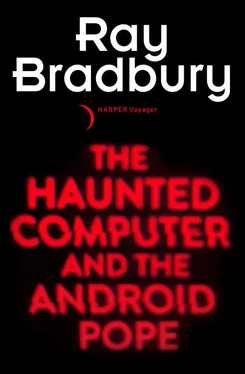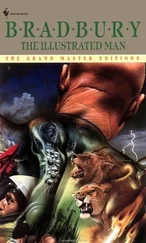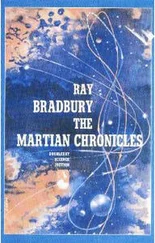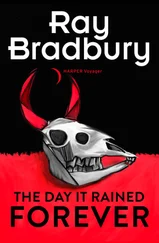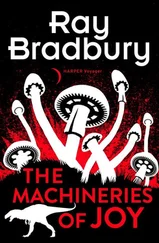Stay home!
I’ve seen a thousand homes go down the tracks
Away, away …
Late night or early morn,
There goes the house, all white, where I was born.
My traveling train
Gives back to me by moon or noontime’s rain
The house, the house, the house
Where I’m reborn again.
As common as sparrows in flight,
There flies by my front porch and me,
Out of sight, out of sight.
We are common together: common house, common weather,
Common boy on a bike on a cool dark night lawn,
Sinking in clover,
Or boy on brick street at dawn, roofing a ball:
Annie over! Annie over !
Where I’ll pop up next, Peoria or Paducah, I don’t know;
All I can say is:
Here I come, here I come,
There I go, there I go!
Always the same boy, bright-eyed as a mouse,
Always the same folks on the porch of that house,
Swinging by in the light,
Drowning deep in the night,
There they drift, there they fly
At the train whistle’s cry:
O good-bye, O good-bye.
Lawn and porch on the run; boy’s face like the sun
Looking up through the rain
As again and again, the boy who was me
Climbs a branch, drops from tree,
But arrives to depart
While his shout cracks my heart.
Lord, does anyone see
All those boys who are me,
And does anyone know all those homes white as snow
That like riverboats glide
In the tide of the train as it takes me away?
Who can say, who can say?
Just my time machine moves
Through the land of my loves,
And more houses and boys and more trees and more lawns
Wait there just ahead in the circling dawns.
A procession of dreams!
O, isn’t God clever?
He’s cloned me in teams.
So? I’ll live here forever!
Nor Is the Aim of Man to Stay Beneath a Stone
They say that we must falter, fail, and fall away
To all that’s lost;
I say the cost is overmuch
I’d spend us better with our will.
The mills of our machine-made gods grind swift not slow,
I with their lightning-arcs and wild illuminations go
To light a path
Not to the grave but walking on the air
On stairs of weather, cloud, and sky.
I would not doom us with those easy repetitions
Of old kettledrumming dooms
I heard from childhood on in dull, drab,
Ideas long since gone to incestuous
Intellectuals’ rooms …
Where they make litanies of night to scare their souls
And turn from birds and skies and stars
To imitate death moles or morbid beetles ticking death
Which if we let them would dig deep in time and keep
Our flesh in most inconsequent black holes.
That’s not my game,
Nor is the aim of man to stay beneath a stone.
To own the universe, our aim. And never die.
That’s mine, and yours, and yours, and yours,
To shame dumb death, leave Earth to dust, tread moon,
Vault Mars, and win the stars with flame …
Or know the reason why.
Joy Is the Grace We Say to God
Joy is the grace we say to God
For His gifts given.
It is the leavening of time,
It splits our bones with lightning,
Fills our marrow
With a harrowing of light
And seeds our blood with sun,
And thus we
Put out the night
And then
Put out the night.
Tears make an end of things;
So weep, yes, weep.
But joy says, after that, not done …
No, not by any means. Not done!
Take breath and shout it out!
That laugh, that cry which says: Begin again,
So all’s reborn, begun!
Now hear this, Eden’s child,
Remember in thy green Earth heaven,
All beauty-shod:
Joy is the grace we say to God.
They Have Not Seen the Stars
They have not seen the stars,
Not one, not one
Of all the creatures on this world
In all the ages since the sands first touched the wind
Not one, not one,
No beast of all the beasts has stood
On meadowland or plain or hill
And known the thrill of looking at those fires;
Our soul admires what they, oh, they, have never known.
Five billion years have flown in turnings of the spheres
But not once in all those years
Has lion, dog, or bird that sweeps the air
Looked there, oh, look. Looked there, ah God, the stars;
Oh, look, look there!
It is as if all time had never been,
Or universe or sun or moon or simple morning light.
Their tragedy was mute and blind, and so remains. Our sight?
Yes, ours ? To know now what we are.
But think of it, then choose—now, which?
Born to raw Earth, inhabiting a scene
And all of it, no sooner viewed, erased, gone blind
As if these miracles had never been.
Vast circlings of sounding light, of fire and frost,
And all so quickly seen then quickly lost?
Or us, in fragile flesh, with God’s new eyes
That lift and comprehend and search the skies?
We watch the seasons drifting in the lunar tide
And know the years, remembering what’s died.
Oh, yes, perhaps some birds some nights
Have felt Orion rise and tuned their flights
And turned southward
Because star-charts were printed in their sweet genetic dreams—
Or so it seems.
But, see ? But really see and know ?
And, knowing, want to touch those fires,
To grow until the mighty brow of man Lamarckian-tall
Knocks earthquakes, striking moon,
Then Mars, then Saturn’s rings;
And, growing, hope to show
All other beasts just how
To fly with dreams instead of ancient wings.
So, think on this: we’re first! the only ones
Whom God has honored with his rise of suns.
For us as gifts Aldebaran, Centauri, homestead Mars.
Wake up, God says. Look there. Go fetch.
The stars. Oh, Lord, much thanks. The stars!
This Attic Where the Meadow Greens
This attic where the meadow greens
Now keeps itself a world between two worlds,
One world of weather, one of blood and dream.
Its architectural scheme there high above
Was to make heaps and sprawls of silent time
Abide it there to know a slower beat
Than any river street or dogprint lawn.
Here yawns lost yestermorn
When loss and death were yet unborn
And fear, locked in the womb, stopped up its breath
To let it whisper forth some other year.
A gardener lived here once—
My grandpapa whose notion
Was to tend and seed a rooftop sea of grass
And garret-mind it under glass—
A private lawn, each blade an hour, minute, second
Burning bright
Where boys and dogs might meet to fight, or gambol on,
And smile.
And all the while poor beasts below
In stifled traffics come and go.
So, late and drowned in night
Or striking midriff day,
The old man bent to rattletap croquet
And marched between the arching hoops
And found it clever to knock brightly colored balls
That comet-ran forever down our hidden sky.
In meadow-attic, with fanatic skill and ease
He touched to kill wrong destinies with games.
Full joys, fine aims he planned and played above the trees.
Death’s sneeze? was corked! And if dark came some future day
He would be challenged to delay awhile,
Take up croquet, seize mallet,
Stop balloting for night,
Stand bright, know day,
Whack blazing orb-sun, rolling fire,
Lose at croquet to Gramps,
Читать дальше
